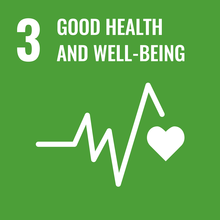
Goal 3: Ensure healthy lives and promote well-being for all at all ages
Healthy people are the foundation for healthy economies. Prior to the pandemic, significant strides were made in increasing life expectancy and reducing some common causes of child and maternal mortality. But more efforts are needed to fully eradicate a wide range of diseases and address many different persistent and emerging health issues worldwide. By focusing on providing more efficient funding of health systems, improved sanitation and hygiene, and increased access to physicians, significant progress can be made in helping to save the lives of millions.
Infographic and Overview Why It Matters Things To Do The Thirteen Targets
Sustainable Development Goal #3 explores how we can get back on track to making progress toward improving the health of millions of people. At the University of Minnesota, this includes tracking how zoonotic and other infectious diseases spread, developing life-altering medications and medical equipment, advocating for needed health policy changes, and training future generations of medical practitioners who will continue to fight for improved health outcomes worldwide.
RESEARCH AND EXPERTISE
OUTREACH AND PUBLIC ENGAGEMENT
Current collaborations with health institutions
M Health Fairview is an academic health system representing a collaboration among the University of Minnesota, University of Minnesota Physicians, and Fairview Health Services. They combine breakthrough innovation with extensive roots in community medicine.
The University has numerous clinical training partnerships across Minnesota and beyond, many of them in rural or underserved communities. These serve as training sites for our more than 7,000 health sciences students. Interactive map shows placement sites including the organization and nature of the partnership for sites in the USA (scroll out on the map).
The Minnesota Partnership for Biotechnology and Medical Genomics is a unique collaborative venture among the Mayo Clinic, University of Minnesota, and State of Minnesota. The Partnership seeks to position Minnesota as a world leader in biotechnology and medical genomics applications that will result in important new medical discoveries, thereby improving health care for patients.
Health outreach programs
Extension brings Minnesotans together to build a better future through University science-based knowledge, expertise and training. UMN Extension work related to food, health and nutrition improves food literacy, physical activity, food safety and healthy food access for Minnesotans and the food service industry.
The Minnesota Northstar GWEP is a five-year project funded by the Health Resources and Services Administration, the primary federal agency for improving health care for people who are geographically isolated and economically or medically vulnerable. Their website includes a map of the many community partners they have for geriatric health in Minnesota.
The Community-University Health Care Center (CUHCC) is a community clinic that welcomes patients of every age, race, color, ethnicity and language and has served the community for over 50 years. It provides medical, dental and mental health care, legal services, advocacy for domestic abuse and sexual assault, and much more.
Shared sports facilities
Below are a few examples of the wide variety of free and accessible UMN sports and recreational facilities for communities and underserved populations.
Several of the UMN Morris Sports facilities have agreements and policies in place allowing for joint use with the broader Morris community. For instance, Morris Area High School uses the Big Cat Stadium for football, the Minnesota Morris baseball team uses the baseball field and the high school and public has access to facilities in the Cougar Sports Center.
Bagley Nature Area along the northwest part of the UMD campus is 59 acres of forest, pond, and open area. It is publicly available for running, cross-country skiing, walking, or any other quiet outdoor activity.
Beyond Walls’ intensive, year-round youth development model combines squash instruction, academic mentoring, college preparation and community service. Its Urban Squash program for underserved youth uses UMN Recreational and Wellness Center and is an example of a UMN recreational partnership to support community-based social programs.
EDUCATION AND STUDENTS
UMN POLICIES AND ADMINISTRATION
Sexual and reproductive health care services for students
Below are some representative examples of the comprehensive sexual and reproductive health care services available across the UMN system.
UMN Boynton Health Gynecology Services includes gynecologic infection treatment, birth control counseling and prescriptions, pregnancy testing, counseling and education, fertility evaluations, preconception care, and other services. UMN Health Services also include providing students with free birth control information and products on request.
Sexually transmitted infection (STI) testing is an important part of the University's preventative health care offerings. STI testing is available in Boynton Health's women’s health, transgender health, and primary care clinics. STI testing can be added to a primary care visit, scheduled as a separate appointment, or, in some cases, testing can be done at a drop in testing site.
University of Minnesota Health Services at Crookston is supported exclusively through student fees. UMC student examinations, assessment, and treatment performed by registered nurses are free of charge and include sexual health and family planning counseling, pregnancy testing and STI testing and referrals. Samples of over-the-counter medications and supplies are also free.
Mental health support
Examples of free mental health support services for staff and students that exist on all UMN system campuses.
The University provides free and confidential individual and group counseling sessions to UMN undergraduate, graduate and professional students at each campus in the system. Services are offered for personal issues, academic difficulties, and career uncertainty.
The university provides additional free, mental health services including crisis phone and texting service, online therapy modules, pet therapy and peer stress support. A central, online resource hub—safecampus.umn.edu—is student-focused but contains helpful information for all members of the University community.
As part of their comprehensive benefits package, UMN staff have access to free Employee Assistance Programs conducted by Lyra Health, resources to help them manage stress and enhance their resilience through the Wellbeing Program via Virgin Pulse, and onsite access to the Earl E. Bakken Center for Spirituality & Healing, which provides a variety of education and wellness programming.
Smoke-free policy

All five UMN campuses have comprehensive, publicly accessible policies that prohibit smoking on campus. A few exceptions to the policy include: scientific studies that require tobacco use, Traditional Native American Spiritual or Cultural Ceremonies (indoors and outdoors), smoking as part of theatrical productions and/or when in enclosed, privately-owned vehicles on campus. This policy underwent a comprehensive review and minor clarifications/updates were added in 2018.
